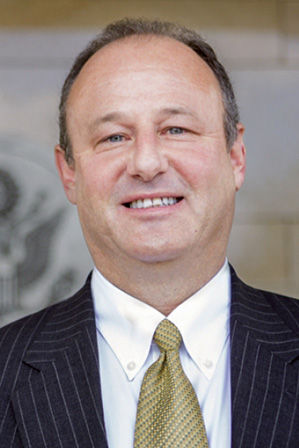Living Up to Our Ideals
President’s Views
BY ERIC RUBIN

As I write this, cities across the United States are burning, and the world sees the image of an America that is angry, unstable and divided. We can do better, and I believe we will. But we need to face our failures and confront our weaknesses.
There is no question that America has been a force for good on human rights and progress. But we have failed to address our own problems. And we have been guilty of arrogance and self-importance. Should U.S. diplomats really be writing human rights reports every year on Norway, Canada, Switzerland and Finland (for example), when our country’s own record is far from ideal?
Being a U.S. diplomat has never been simple. Until the 1960s, Foreign Service officers needed to represent a country that was based on a post–Civil War settlement that included segregation and Jim Crow laws. While the United States fought Hitler and then challenged Stalin’s Soviet Union in the Cold War, we had realities at home that can only be described as racist and wrong. And yet we persisted in fighting for a better world.
The United States designed and built the postwar institutions that shaped the modern world. We (mostly) supported decolonization and the independence of the new nations of the developing world. We opposed apartheid in South Africa (eventually) and the imposition of racial segregation and white rule in Rhodesia.
But we also fought a war in Vietnam that in historical retrospect was a big mistake. We adhered to the famous line by our great president Franklin Delano Roosevelt that “he may be a son of a bitch, but he is our son of a bitch.” While Roosevelt was describing Nicaragua’s Somoza, the sentiment also describes our relationship to the shah of Iran, and to the murderous military dictatorships in Latin America in the 1960s and 1970s.
And yet we also fought for freedom. World War II was a fight for human liberty. The Cold War, despite our many mistakes and overreactions, was about a vision of human civilization that was based on democracy and human rights.
We can be proud of many successes—the creation of NATO and the Organization for Security and Cooperation in Europe; our support for European integration that led to creation of the European Community and, later, the European Union; the development of the family of United Nations organizations that have been responsible for so much progress in the daily lives of millions of people; and the many bilateral and multilateral alliances that have undergirded world stability.
As Americans, we can and should be proud of this record. The U.S. Foreign Service can be proud of its role in advancing peace and prosperity across the globe. But there have been big mistakes, from the invasion of Iraq to our failure to secure the future of Afghanistan.
U.S. diplomacy must focus on how we can make a difference in advancing our national interests, security and prosperity. The post–Cold War era is ending, and the international challenges before us demand a new, coherent foreign policy vision. But the need for America to have strong representation abroad remains critical.
The United States must get back to the concepts enshrined in the Foreign Service Act of 1980, with professional diplomats at the center of our policymaking process.
And the United States must return to our commitment to the security, prosperity and stability of the world. No other country is going to replace us. No other country can do so. It is not wrong or presumptuous for us to believe that we have a special role to play. We have played it for the past 75 years, and the world is mostly the better for it, despite our mistakes.
As former Assistant Secretary for Democracy and Human Rights Harold Koh said in the June FSJ, “The United States is founded on the simple, radical idea of universal human rights.” Our country has failed to fully live up to its own promise of freedom and justice for all, but it is our country’s founding purpose and ideals, and our willingness to fight for them, that make us uniquely qualified for global leadership.

